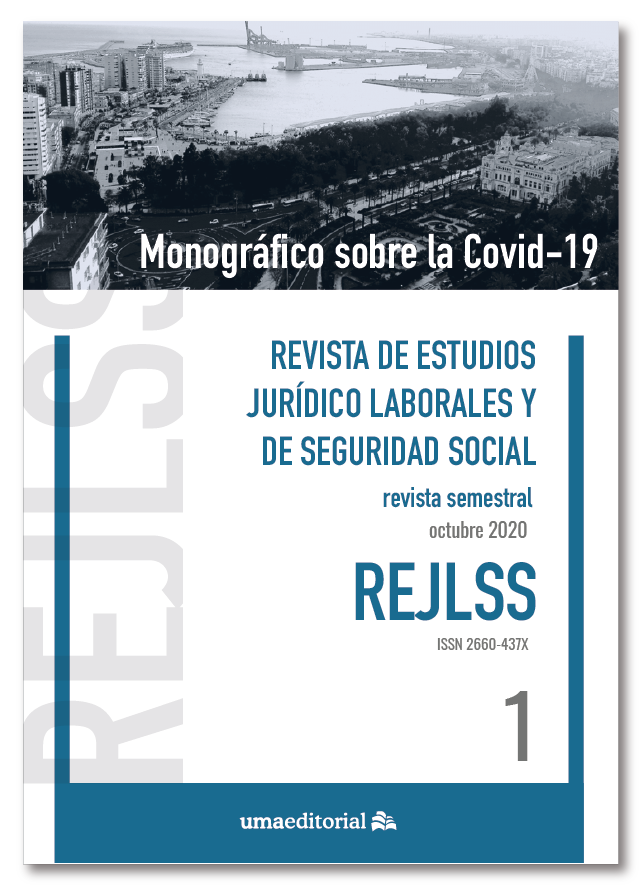Activities and services characterized as essential by the sanitary emergency regulation:
Are them essential services in order to limit the right to strike?
DOI:
https://doi.org/10.24310/rejlss.vi1.10415Keywords:
Health emergency, essential services, right to strike, limitsAbstract
The context of pandemic and declaration of a health emergency in Argentina brought about a normative succession of executive decrees of necessity and urgency of the Presidency of the Republic, resolutions of the Ministry of Labour, Employment and Social Security and other administrative regulations, with direct incidence on the individual working relationships and projections at the collective level. This exceptional situation, in a social and regulatory sense, is addressed in this study focused on the exercise of the right of strike in the aforementioned context, especially considering that the exceptional regulations have declared some activities and services as "essentials in the emergency" that exceed the framework of essential services listed in the law in order to limit the indicated right. The author tries to answer the question about the hypothetical assimilation or distinction between both qualifications of "essentiality".
Downloads
Metrics
Publication Facts
Reviewer profiles N/A
Author statements
Indexed in
-
—
- Academic society
- N/A
- Publisher
- Universidad de Málaga. UMA Editorial
References
Baylos Grau, A., Servicios esenciales, servicios mínimos y derecho de huelga, Bomarzo, Albacete, 2018, p. 93.
García, H.O., "Acción 'directa' y conciliación: apostillas y conjeturas sobre el procedimiento aplicable a la huelga y el lock-out", Anuario de la Asociación Argentina de Derecho del Trabajo y de la Seguridad Social 2013, Año IV - Nº 4 Derecho Colectivo del Trabajo, Rubinzal-Culzoni Editores, Santa Fe, 2014, pp. 85/ 118.
García, H.O., "La huelga en los servicios esenciales",en AA.VV. (Ackerman, M.E. Dir. y Tosca, D.M. Coord.), Tratado de Derecho del Trabajo, primera edición, T. VIII - Relaciones colectivas de trabajo II, Rubinzal-Culzoni Editores, Santa Fe, 2007, pp. 805/887.
García, H.O., "La huelga en los servicios esenciales", en AA.VV. (Ackerman, M.E. Dir. y Tosca, D.M. Coord.), Tratado de Derecho del Trabajo, segunda edición, T. VIII - Relaciones colectivas de trabajo II, Rubinzal-Culzoni Editores, Santa Fe, 2020 (en proceso de edición).
García, H.O., "La huelga en los servicios esenciales" en AA.VV. (Rodríguez Mancini, J. Dir.), Derecho del Trabajo, Astrea, Buenos Aires, 2010, t. 3, pp. 290/387.
Gernigon, B., Odero, A. y Guido, H., "Principios de la OIT sobre el derecho de huelga", Revista Internacional del Trabajo, vol. 117 (1998), núm. 4, p. 486.
Machado, J.D. y Arese, C. y Guirado, D., "Presentación", Revista de Derecho Laboral. Actualidad, Suplemento digital “El impacto del coronavirus en las relaciones laborales”, Dossier Nº 1, Rubinzal-Culzoni Editores, Santa Fe, 2020, p. 3.
OIT, Comité de Libertad Sindical, 309º Informe, caso nº 1916.
OIT, Comité de Libertad Sindical, 292º Informe, caso nº 1679.
OIT, La libertad sindical. Recopilación de decisiones y principios del Comité de Libertad Sindical del Consejo de Administración de la OIT, quinta edición [revisada], Oficina Internacional del Trabajo, Ginebra, 2006, p. 124, párr. 574 y 576.
Tribuzio, J.E., "La huelga en los servicios esenciales", en AA.VV. (Simón, J.C. Dir. y Ambesi, L. Coord.), Tratado de Derecho Colectivo del Trabajo, La Ley, Buenos Aires, 2012, t. II, p. 755.
Ugarte Cataldo, J.L., Huelga y derecho, Thomson Reuters, Santiago, 2016, pp. 195/196.
Vivero Serrano, J.B., La huelga en los servicios esenciales, Lex Nova, 1ª edición, Valladolid, 2002, p. 130.
Downloads
Published
How to Cite
Issue
Section
License
In the Revista de Estudios Juridico Laborales y de Seguridad Social (REJLSS) we are clearly committed to a policy of open access to scientific knowledge (See Berlin Declaration).
Those authors who have publications with this journal accept the following terms:
This journal provides immediate free access to its content under the principle of making research freely available to the public. All the contents published in the REJLSS are subject to the Creative Commons license
Attribution-NonCommercial-NoDerivatives 4.0 International (CC BY-NC-ND 4.0)
Copyrights are of two kinds: moral and patrimonial. Moral rights are perpetual, inalienable, non-transferable, inalienable, unattachable and imprescriptible prerogatives. In accordance with Spanish copyright legislation, the authors who publish in REJLSS retain the moral right over their work, as well as the ownership of the patrimonial right, which will be transferred to the University of Malaga for its dissemination in open access.
The patrimonial rights, refer to the benefits that are obtained by the use or disclosure of the works. REJLSS is published in open access and is exclusively authorized to perform or authorize by any means the use, distribution, dissemination, reproduction, adaptation, translation or transformation of the work.
It is the responsibility of the authors to obtain the necessary permissions of the images that are subject to copyright.
Authors whose contributions are accepted for publication in this journal retain the non-exclusive right to use their contributions for academic, research and educational purposes, including self-archiving or depositing in open access repositories of any kind.
The electronic edition of this magazine is edited by the Editorial of the University of Malaga (UmaEditorial), being necessary to cite the origin in any partial or total reproduction.
The authors may adopt other non-exclusive license agreements for the distribution of the version of the published work (eg: deposit it in an institutional telematic archive or publish it in a monographic volume) provided that the initial publication is indicated in this magazine.
Authors are allowed and recommended to disseminate their work through the Internet (eg, in institutional telematic archives or on their website) before and during the submission process, which can produce interesting exchanges and increase citations of the published work.







19.png)
